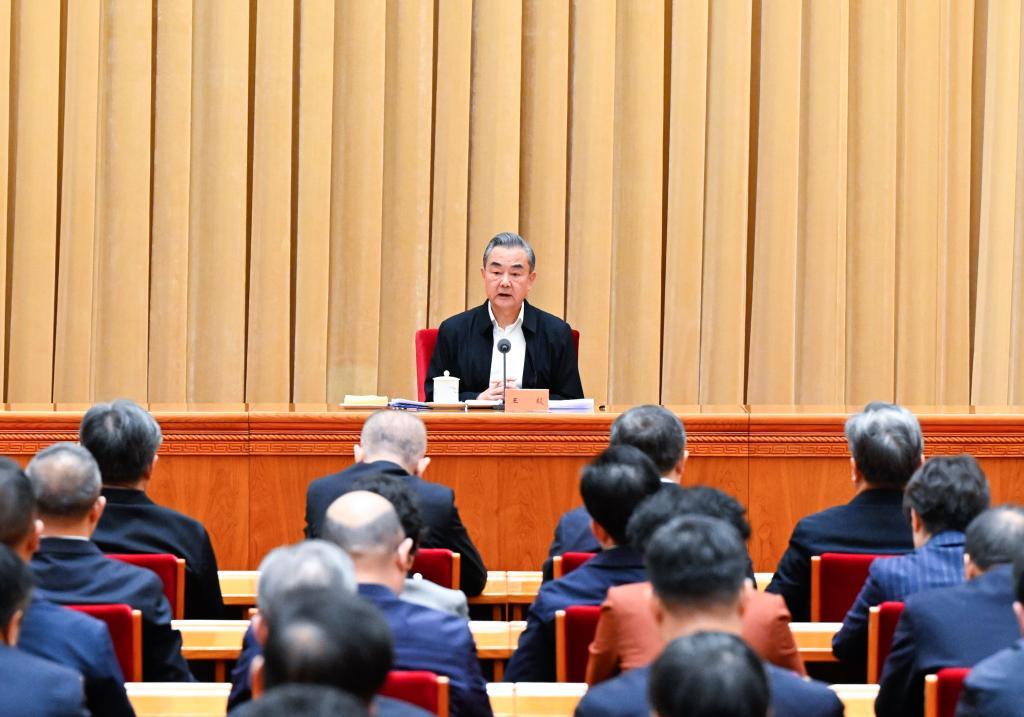We will stay firmly rooted in Chinese culture. We will collect and refine the defining symbols and best elements of Chinese culture and showcase them to the world. We will accelerate the development of China’s discourse and narrative systems, better tell China’s stories, make China’s voice heard, and present a China that is credible, appealing, and respectable.
中央外事工作会议在北京举行 习近平发表重要讲话
发布时间:2023-12-29 08:57:25 | 来源:新华社 | 作者: | 责任编辑:丁素云中央外事工作会议在北京举行
习近平发表重要讲话 李强主持
赵乐际王沪宁蔡奇丁薛祥李希韩正出席会议
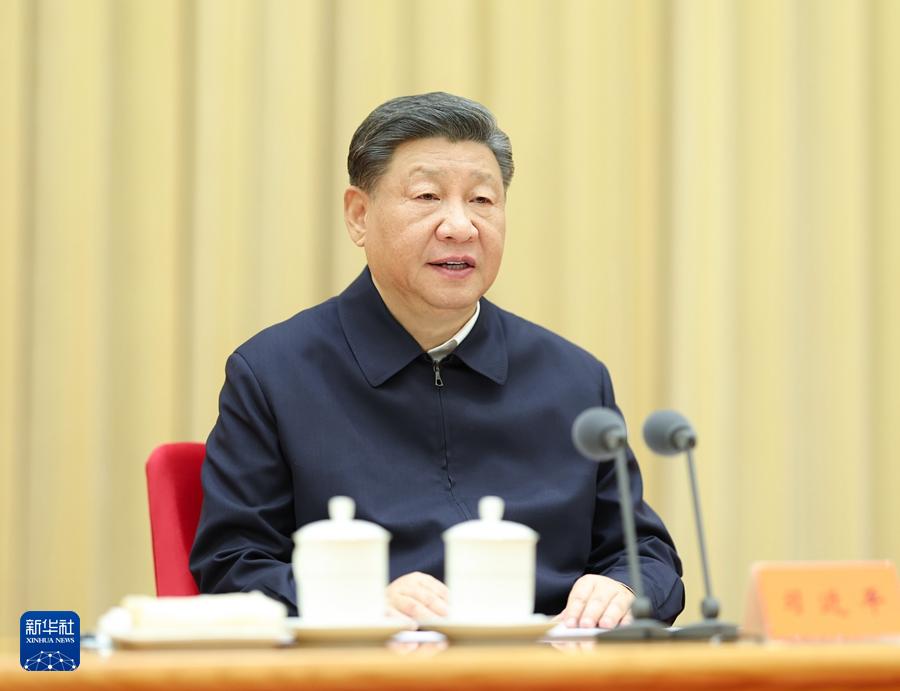
12月27日至28日,中央外事工作会议在北京举行。中共中央总书记、国家主席、中央军委主席习近平出席会议并发表重要讲话。新华社记者 鞠鹏 摄
新华社北京12月28日电 中央外事工作会议12月27日至28日在北京举行。中共中央总书记、国家主席、中央军委主席习近平出席会议并发表重要讲话。中共中央政治局常委李强、赵乐际、王沪宁、蔡奇、丁薛祥、李希,国家副主席韩正出席会议。
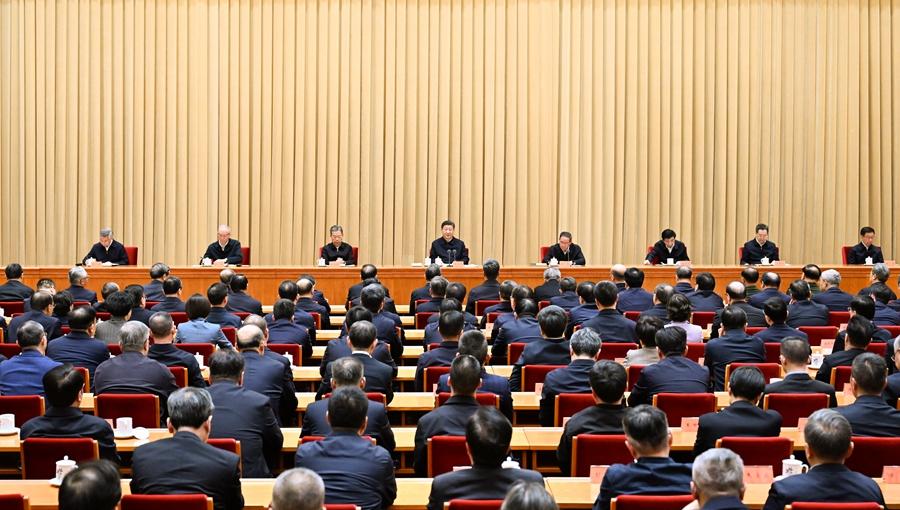
12月27日至28日,中央外事工作会议在北京举行。中共中央总书记、国家主席、中央军委主席习近平出席会议并发表重要讲话。李强、赵乐际、王沪宁、蔡奇、丁薛祥、李希、韩正出席会议。新华社记者 谢环驰 摄
习近平在重要讲话中系统总结新时代中国特色大国外交的历史性成就和宝贵经验,深刻阐述新征程对外工作面临的国际环境和肩负的历史使命,对当前和今后一个时期的对外工作作了全面部署。李强在主持会议时强调,要以习近平外交思想为指导做好新征程上的对外工作,并就学习领会和贯彻落实习近平总书记重要讲话精神提出要求。
会议认为,党的十八大以来,在推进新时代中国特色社会主义事业的伟大征程中,对外工作取得历史性成就、发生历史性变革。一是创立和发展了习近平外交思想,开辟了中国外交理论和实践的新境界,为推进中国特色大国外交提供了根本遵循。二是彰显了我国外交鲜明的中国特色、中国风格、中国气派,树立了自信自立、胸怀天下、开放包容的大国形象。三是倡导构建人类命运共同体,指明了人类社会共同发展、长治久安、文明互鉴的正确方向。四是坚持元首外交战略引领,在国际事务中日益发挥重要和建设性作用。五是全面运筹同各方关系,推动构建和平共处、总体稳定、均衡发展的大国关系格局。六是拓展全方位战略布局,形成了范围广、质量高的全球伙伴关系网络。七是推动高质量共建“一带一路”,搭建了世界上范围最广、规模最大的国际合作平台。八是统筹发展和安全,以坚定意志和顽强斗争有效维护国家主权、安全、发展利益。九是积极参与全球治理,引领国际体系和秩序变革方向。十是加强党中央集中统一领导,巩固了对外工作大协同格局。
会议强调,新时代十年,我们在对外工作中经历了不少大风大浪,战胜了各种困难挑战,开创了中国特色大国外交新局面,我国外交的战略自主性和主动性显著增强。我国已成为更具国际影响力、创新引领力、道义感召力的负责任大国。
会议指出,在新时代外交工作实践中,我们积累了一系列宝贵经验。必须做到坚持原则,在关乎人类前途命运和世界发展方向的重大问题上,要旗帜鲜明、站稳立场,牢牢占据国际道义制高点,团结争取世界大多数。必须体现大国担当,坚持弘扬独立自主精神,坚持引领和平发展,坚持促进世界稳定和繁荣。必须树立系统观念,以正确的历史观、大局观把握大势、统筹兼顾、掌握主动。必须坚持守正创新,坚守中国外交的优良传统和根本方向,同时开拓进取,推动理论和实践创新。必须发扬斗争精神,坚决反对一切强权政治和霸凌行径,有力捍卫国家利益和民族尊严。必须发挥制度优势,在党中央集中统一领导下,各地区各部门协同配合,形成强大合力。
会议指出,世界大变局加速演进,世界之变、时代之变、历史之变正以前所未有的方式展开,世界进入新的动荡变革期,但人类发展进步的大方向不会改变,世界历史曲折前进的大逻辑不会改变,国际社会命运与共的大趋势不会改变,对此我们要有充分的历史自信。
会议认为,展望未来,我国发展面临新的战略机遇。新征程上,中国特色大国外交将进入一个可以更有作为的新阶段。要紧紧围绕党和国家中心任务,稳中求进、守正创新,坚定维护国家主权、安全、发展利益,开辟中国外交理论与实践新境界,塑造我国和世界关系新格局,把我国国际影响力、感召力、塑造力提升到新高度,为以中国式现代化全面推进强国建设、民族复兴伟业营造更有利国际环境、提供更坚实战略支撑。
会议指出,构建人类命运共同体是习近平外交思想的核心理念,是我们不断深化对人类社会发展规律认识,对建设一个什么样的世界、怎样建设这个世界给出的中国方案,体现了中国共产党人的世界观、秩序观、价值观,顺应了各国人民的普遍愿望,指明了世界文明进步的方向,是新时代中国特色大国外交追求的崇高目标。新时代以来,构建人类命运共同体从中国倡议扩大为国际共识,从美好愿景转化为丰富实践,从理念主张发展为科学体系,成为引领时代前进的光辉旗帜。概括地讲,构建人类命运共同体,是以建设持久和平、普遍安全、共同繁荣、开放包容、清洁美丽的世界为努力目标,以推动共商共建共享的全球治理为实现路径,以践行全人类共同价值为普遍遵循,以推动构建新型国际关系为基本支撑,以落实全球发展倡议、全球安全倡议、全球文明倡议为战略引领,以高质量共建“一带一路”为实践平台,推动各国携手应对挑战、实现共同繁荣,推动世界走向和平、安全、繁荣、进步的光明前景。
会议指出,针对当今世界面临的一系列重大问题重大挑战,我们倡导平等有序的世界多极化和普惠包容的经济全球化。平等有序的世界多极化,就是坚持大小国家一律平等,反对霸权主义和强权政治,切实推进国际关系民主化。要确保多极化进程总体稳定和具有建设性,就必须共同恪守联合国宪章宗旨和原则,共同坚持普遍认同的国际关系基本准则,践行真正的多边主义。普惠包容的经济全球化,就是顺应各国尤其是发展中国家的普遍要求,解决好资源全球配置造成的国家间和各国内部发展失衡问题。要坚决反对逆全球化、泛安全化,反对各种形式的单边主义、保护主义,坚定促进贸易和投资自由化便利化,破解阻碍世界经济健康发展的结构性难题,推动经济全球化朝着更加开放、包容、普惠、均衡的方向发展。
会议要求,当前和今后一个时期,对外工作要以习近平新时代中国特色社会主义思想特别是习近平外交思想为指导,对标中国式现代化目标任务,坚持自信自立、开放包容、公道正义、合作共赢的方针原则,围绕推动构建人类命运共同体这条主线,与时俱进加强战略部署,深化完善外交布局,突出问题导向,运用系统思维,更加立体、综合地明确外交战略任务,以更加积极主动的历史担当、更加富有活力的创造精神,开创中国特色大国外交新局面。
会议指出,外交守正创新是新征程上开创中国特色大国外交新局面的必然要求,是更好支撑中国式现代化的必然要求。要加强思想理论武装,深化体制机制改革,推动外交队伍建设,不断增强对外工作的科学性、预见性、主动性、创造性。
会议强调,必须毫不动摇坚持外交大权在党中央,自觉坚持党中央集中统一领导,进一步强化党领导对外工作的体制机制。各地区各部门要胸怀大局、协同配合,不折不扣贯彻落实党中央对外工作决策部署。
王毅作总结讲话。中央宣传部、中央对外联络部、商务部、中央军委联合参谋部、云南省负责同志及常驻联合国代表团代表作交流发言。
中共中央政治局委员、中央书记处书记,全国人大常委会有关领导同志,国务委员,最高人民法院院长,最高人民检察院检察长,全国政协有关领导同志出席会议。
中央外事工作委员会委员,各省、自治区、直辖市和计划单列市、新疆生产建设兵团,中央和国家机关有关部门、有关人民团体、中央军委机关有关部门,部分中管金融机构主要负责同志,驻外大使、大使衔总领事、驻国际组织代表等参加会议。
Central conference on work relating to foreign affairs held in Beijing
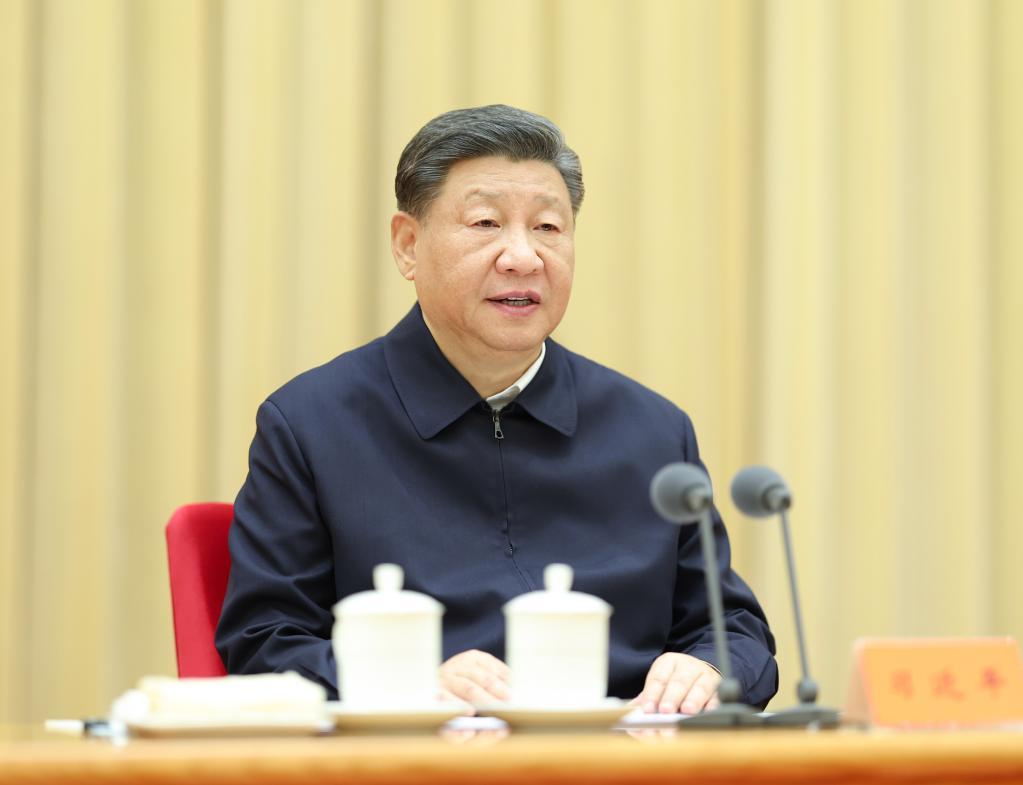
Xi Jinping, general secretary of the Communist Party of China Central Committee, Chinese president and chairman of the Central Military Commission, delivers an important speech at the Central Conference on Work Relating to Foreign Affairs in Beijing, capital of China. The conference was held in Beijing from Wednesday to Thursday. (Xinhua/Ju Peng)
BEIJING, Dec. 28 (Xinhua) -- The Central Conference on Work Relating to Foreign Affairs was held in Beijing from Wednesday to Thursday. Xi Jinping, general secretary of the Central Committee of the Communist Party of China (CPC), Chinese president and chairman of the Central Military Commission, attended the conference and delivered an important address.
Members of the Standing Committee of the Political Bureau of the CPC Central Committee Li Qiang, Zhao Leji, Wang Huning, Cai Qi, Ding Xuexiang and Li Xi, and Vice President Han Zheng attended the conference.
In his important address, Xi presented a systematic review of the historic achievements and valuable experience of major-country diplomacy with Chinese characteristics in the new era, gave a profound exposition on the international environment and historical mission of China's external work on the new journey, and made comprehensive plans for China's external work for the present and coming periods. Presiding over the conference, Li Qiang emphasized the importance of ensuring sound external work on the new journey under the guidance of Xi Jinping Thought on Diplomacy, and set out requirements for studying and implementing the guiding principles of General Secretary Xi Jinping's important address.
It was made clear at the conference that since the 18th CPC National Congress, historic achievements have been secured and historic changes have taken place in China's external work on the great journey of advancing the cause of socialism with Chinese characteristics in the new era. First, we have established and developed Xi Jinping Thought on Diplomacy, opening up new vistas in the theory and practice of China's diplomacy and providing the fundamental guideline for advancing major-country diplomacy with Chinese characteristics. Second, we have showcased distinct Chinese characteristics, style and ethos in our diplomacy, and established the image of a confident, self-reliant, open and inclusive major country with a global vision. Third, we have advocated the building of a community with a shared future for mankind, pointing the right direction for human society leading to common development, lasting peace and security, and mutual learning between civilizations. Fourth, we have followed the strategic guidance of head-of-state diplomacy, and played an increasingly important and constructive role in international affairs. Fifth, we have taken a holistic approach to our relations with all parties, with a view to fostering major-country dynamics featuring peaceful coexistence, overall stability and balanced development. Sixth, we have expanded a comprehensive strategic layout, and formed a wide-ranging, high-quality global network of partnerships. Seventh, we have advanced high-quality Belt and Road cooperation, and established the world's most broad-based and largest platform for international cooperation. Eighth, we have worked to both pursue development and safeguard security, and effectively upheld China's sovereignty, security and development interests with a firm will and an indomitable fighting spirit. Ninth, we have taken an active part in global governance, and shown the way in reforming the international system and order. Tenth, we have strengthened the centralized, unified leadership of the CPC Central Committee, and brought about greater coordination in China's external work.
It was underlined at the conference that in the decade of the new era, we have seen high winds and choppy waters and overcome various difficulties and challenges in China's external work. We have opened up new prospects in major-country diplomacy with Chinese characteristics, and gained much more strategic autonomy and initiative in our diplomacy. China has become a responsible major country with enhanced international influence, stronger capacity to steer new endeavors, and greater moral appeal.
It was pointed out at the conference that a range of valuable experience has been gained in the new era of Chinese diplomacy. It is imperative to uphold principles. On major issues concerning the future of humanity and the direction of the world, we must take a clear and firm position, hold the international moral high ground, and unite and rally the overwhelming majority in our world. It is imperative to shoulder China's responsibility as a major country. We need to advocate the spirit of independence, champion peaceful development, and promote global stability and prosperity. It is imperative to apply systems thinking. With a correct understanding of history and of the big picture, we must navigate the prevailing trends, adopt a coordinated approach, and seize the initiative. It is imperative to uphold fundamental principles and break new ground. We need to follow the fine tradition and fundamental direction of China's diplomacy, and at the same time work progressively for innovation in both theory and practice. It is imperative to carry forward our fighting spirit. We must reject all acts of power politics and bullying, and vigorously defend our national interests and dignity. It is imperative to leverage our institutional strengths. Under the centralized, unified leadership of the CPC Central Committee, all regions and all departments must coordinate with each other and build strong synergy.
It was noted at the conference that great transformation is accelerating across the world. Changes of the world, of our times, and of historical significance are unfolding like never before, and the world has entered a new period of turbulence and transformation. Yet the overall direction of human development and progress will not change, the overall dynamics of world history moving forward amid twists and turns will not change, and the overall trend toward a shared future for the international community will not change. We must have full confidence in these trends of historical impact.
It was highlighted at the conference that looking ahead, China faces new strategic opportunities in its development. On the new journey, major-country diplomacy with Chinese characteristics will enter a new stage where much more can be accomplished. We must focus on the central task of the CPC and the country, seek progress while maintaining stability, break new ground while upholding fundamental principles, and firmly safeguard China's sovereignty, security and development interests. We will explore new frontiers in China's diplomatic theory and practice, foster new dynamics in the relations between China and the world, and raise China's international influence, appeal and power to shape events to a new level. We will create a more favorable international environment and provide more solid strategic support for building China into a great modern socialist country in all respects and advancing the great rejuvenation of the Chinese nation on all fronts through the Chinese path to modernization.
It was pointed out at the conference that building a community with a shared future for mankind is the core tenet of Xi Jinping Thought on Diplomacy. It is how China proposes to solve the questions of what kind of world to build and how to build it based on our deepening understanding of the laws governing the development of human society. It reflects the Chinese Communists' worldview, perception of order, and values, accords with the common aspiration of people in all countries, and points the direction for the progress of world civilizations. It is also the noble goal pursued by China in conducting major-country diplomacy with Chinese characteristics for the new era. Since the dawn of this new era, building a community with a shared future for mankind has developed from a Chinese initiative to an international consensus, from a promising vision to substantive actions, and from a conceptual proposition to a scientific system. It has served as a glorious banner leading the progress of the times. In summary, in building a community with a shared future for mankind, the goal is to build an open, inclusive, clean and beautiful world of lasting peace, universal security and shared prosperity, the pathway is promoting global governance that features extensive consultation and joint contribution for shared benefit, the guiding principle is to apply the common values of humanity, the basic underpinning lies in building a new type of international relations, the strategic guidance comes from the implementation of the Global Development Initiative, the Global Security Initiative and the Global Civilization Initiative, and the platform for action is high-quality Belt and Road cooperation. On this basis, we seek to bring countries together to meet challenges and achieve prosperity for all, and usher in a bright future of peace, security, prosperity and progress for our world.
It was pointed out at the conference that given the series of major issues and challenges facing the world today, China calls for an equal and orderly multipolar world and a universally beneficial and inclusive economic globalization. An equal and orderly multipolar world is one in which all countries, regardless of size, are treated as equals, hegemonism and power politics are rejected, and democracy is truly promoted in international relations. To keep the progress toward greater multipolarity generally stable and constructive, the purposes and principles of the United Nations Charter must be observed by all, the universally recognized, basic norms governing international relations must be upheld by all, and true multilateralism must be practiced. A universally beneficial and inclusive economic globalization is one that meets the common needs of all countries, especially the developing countries, and properly addresses the development imbalances between and within countries resulting from the global allocation of resources. It is important to resolutely oppose the attempt to roll back globalization and abuse the concept of security, oppose all forms of unilateralism and protectionism, firmly promote trade and investment liberalization and facilitation, overcome the structural problems hindering the healthy development of the world economy, and make economic globalization more open, inclusive, balanced and beneficial to all.
It was made clear at the conference that in the current and upcoming periods, China's external work shall be guided by Xi Jinping Thought on Socialism with Chinese Characteristics for a New Era and Xi Jinping Thought on Diplomacy in particular. It should serve the goals and missions of Chinese modernization, and follow the principles of self-confidence and self-reliance, openness and inclusiveness, fairness and justice, and win-win cooperation. Focusing on the theme of building a community with a shared future for mankind, we need to strengthen strategic planning in sync with the changing times, deepen and improve our diplomatic layout, follow a problem-oriented approach, and apply a systematic way of thinking. We need to identify the strategic tasks of Chinese diplomacy in a more multi-dimensional and comprehensive manner. We need to act with a stronger sense of historical responsibility and a more vibrant spirit of innovation to make new headway in our major-country diplomacy with Chinese characteristics.
It was pointed out at the conference that upholding fundamental principles and breaking new ground in our external work is the natural requirement of making new headway in our major-country diplomacy with Chinese characteristics on the new journey, and of providing a stronger underpinning for Chinese modernization. It is important to strengthen the intellectual and theoretical competence of the foreign service, deepen reform of systems and institutions, promote the building of a contingent of personnel involved in foreign affairs, and continue to make our external work more science-based, forward-looking, proactive and innovative.
It was stressed at the conference that we must unswervingly uphold the CPC central leadership's ultimate authority over foreign affairs, conscientiously uphold the centralized, unified leadership of the CPC Central Committee, and further strengthen the systems and institutions for the CPC's leadership over external work. All localities and departments should keep in mind the big picture and coordinate with each other to implement the decisions and plans of the CPC Central Committee on our external work in both letter and spirit.
Wang Yi gave concluding remarks. Leading officials of the Publicity Department of the CPC Central Committee, the International Department of the CPC Central Committee, the Ministry of Commerce, the Joint Staff Department of the Central Military Commission and Yunnan Province, and a representative from the Permanent Mission of the People's Republic of China to the United Nations gave presentations at the conference.
Members of the Political Bureau of the CPC Central Committee and members of the Secretariat of the CPC Central Committee, leaders of the Standing Committee of the National People's Congress, State Councilors, President of the Supreme People's Court, Procurator General of the Supreme People's Procuratorate, and leaders of the National Committee of the Chinese People's Political Consultative Conference attended the conference.
Members of the Central Commission for Foreign Affairs, major officials of provinces, autonomous regions, municipalities directly under the Central Government, cities separately listed in the state plan, and the Xinjiang Production and Construction Corps, of the relevant departments of central CPC and state institutions, relevant people's organizations, relevant departments of the Central Military Commission, and of some financial institutions under the direct management of the Central Government, as well as Chinese ambassadors, ambassadorial-rank consuls general posted overseas and representatives to international organizations participated in the conference. ■
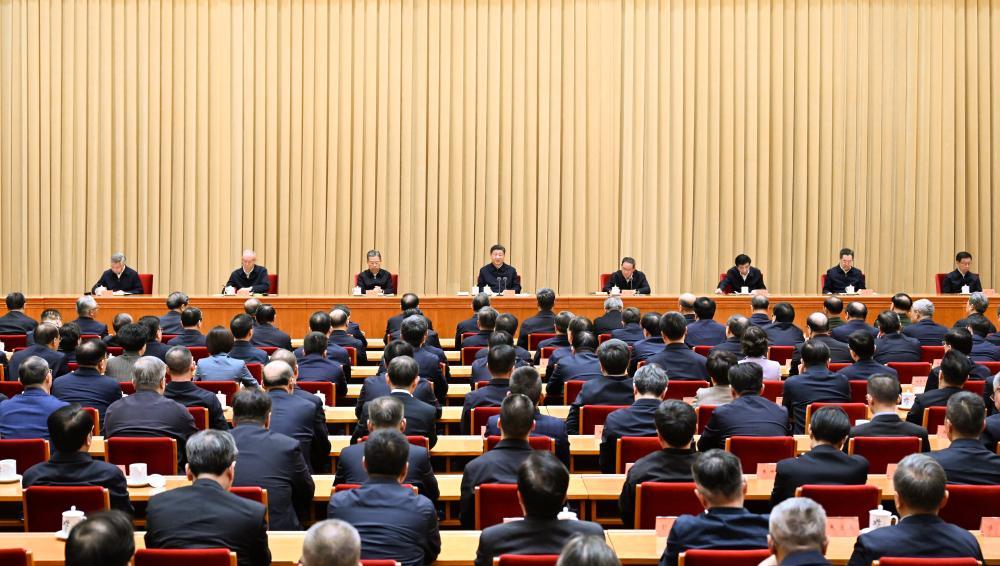
Xi Jinping, general secretary of the Communist Party of China Central Committee, Chinese president and chairman of the Central Military Commission, delivers an important speech at the Central Conference on Work Relating to Foreign Affairs in Beijing, capital of China. The conference was held in Beijing from Wednesday to Thursday. Li Qiang, Zhao Leji, Wang Huning, Cai Qi, Ding Xuexiang, Li Xi and Han Zheng attended the conference. (Xinhua/Xie Huanchi)
Chinese Foreign Minister Wang Yi, also a member of the Political Bureau of the Communist Party of China (CPC) Central Committee and director of the Office of the Foreign Affairs Commission of the CPC Central Committee, gives concluding remarks at the Central Conference on Work Relating to Foreign Affairs in Beijing, capital of China, Dec. 28, 2023. The conference was held in Beijing from Wednesday to Thursday. (Xinhua/Shen Hong)


